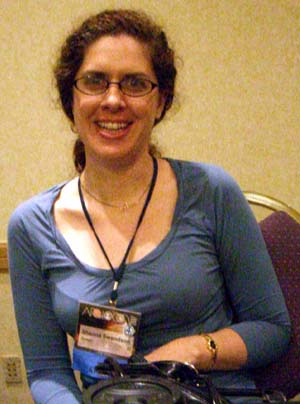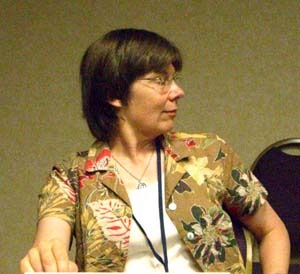Panelists: Katharine Eliska Kimbriel, Alexis Glynn Latner (moderator), Julia Mandala, Chris Roberson, Shanna Swendson
Description in the program book: How do writers know how long a story should be? Is it something they decide or something the story demands? Our panel discusses questions of size, from flash to series. (Don't worry guys, it's perfectly safe.)
It's as if this panel was created with me in mind, so closely it fit my writing predicament (inability to write short stories). But since this was yet another panel on writing and editing, there was bound to be some overlap with the previous two I went to. And so I was able to distill the noteworthy tips or observations into a few sentences.
Apparently a lot of people, including accomplished writers, have trouble writing short stories. Shanna Swendson says she certainly does. All her stories turn into novels. (The same thing happens to me.) She wonders if she trained herself that way, to think in novels. The only time she managed to write short stories was when she wrote a series of connected fanfic stories, that all made up a big 100,000 word story.
Alexis Glynn Latner thinks that people who think in short stories are in the minority. She gave this advice: if you have trouble writing short, pick the most narrowly focused idea you can come up with. She also warned that worldbuilding adds to the word count. So it's much easier to make a story short if it's set in a consensus world -- for example, if it's alternative history. Or elves in the mall.
A woman in the audience said that every time she writes a story, it comes out as series of dialogs, connected with two-sentence transitions. She asked how to make her stories more balanced between dialog and narrative. Alexis Glynn Latner recommended that she take another author's short story she really liked, highlight the dialog and see what the author does between the bits of dialog.
Here are more of my blog posts from ApolloCon 2007.

No comments:
Post a Comment